 Petzlover
Petzlover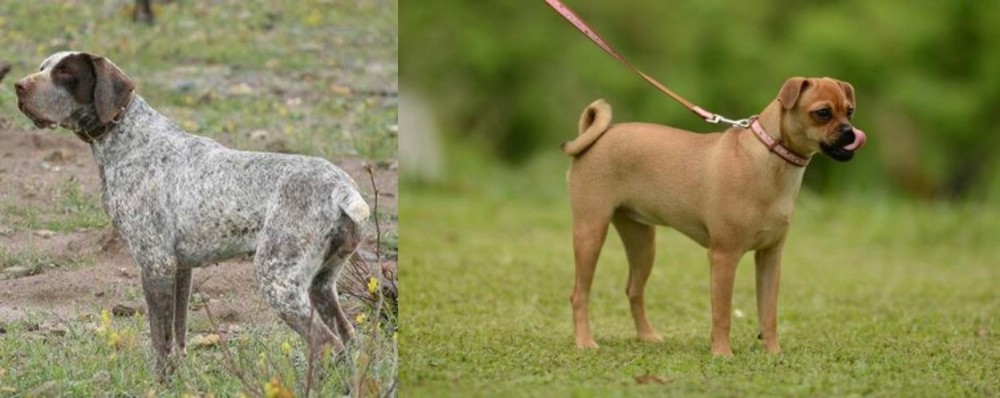 Perdiguero de Burgos is originated from Spain but Muggin is originated from United States. Perdiguero de Burgos may grow 50 cm / 20 inches higher than Muggin. Perdiguero de Burgos may weigh 10 kg / 23 pounds more than Muggin. Both Perdiguero de Burgos and Muggin has almost same life span. Both Perdiguero de Burgos and Muggin has almost same litter size. Perdiguero de Burgos requires Low Maintenance. But Muggin requires High Maintenance
Perdiguero de Burgos is originated from Spain but Muggin is originated from United States. Perdiguero de Burgos may grow 50 cm / 20 inches higher than Muggin. Perdiguero de Burgos may weigh 10 kg / 23 pounds more than Muggin. Both Perdiguero de Burgos and Muggin has almost same life span. Both Perdiguero de Burgos and Muggin has almost same litter size. Perdiguero de Burgos requires Low Maintenance. But Muggin requires High Maintenance
 The Iberian Peninsula is thought to be the place of origin for many of the pointing breeds of Europe, and the Perdiguero de Burgos hails from Spain. Known as the Spanish Pointer, the dog has contributed to the development of other pointer breeds.
The Iberian Peninsula is thought to be the place of origin for many of the pointing breeds of Europe, and the Perdiguero de Burgos hails from Spain. Known as the Spanish Pointer, the dog has contributed to the development of other pointer breeds.
The dog has been around since the 1500s and believed to be a descendent of the Perdiguero Navarro and the Sabueso Español.
Today's Perdiguero de Burgos is smaller and lighter so as to make it into a better bird-hunting dog.
The Perdiguero de Burgos has always been used to hunt deer but today it is used as a pointer of smaller animals and birds.
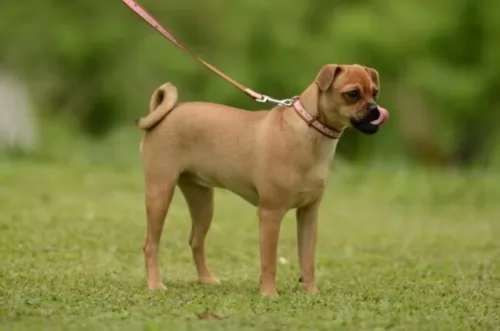 The Muggin is not a purebred dog but rather a cross breed. The hybrid dog population has exploding in the United States in the past ten to fifteen years. A lot of the success of crossbreeding can be attributed to the marketing of these dogs as “Designer Breeds”.
The Muggin is not a purebred dog but rather a cross breed. The hybrid dog population has exploding in the United States in the past ten to fifteen years. A lot of the success of crossbreeding can be attributed to the marketing of these dogs as “Designer Breeds”.
Designer breeds are developed because someone wants some of the characteristics of Breed X and some of the characteristics of Breed Y. Therefore, Designer breed XY is developed. In order to understand this hybrid dog, you need to understand the two purebred breeds they come from. The Muggin is the result of crossing the purebred Pug and the purebred Miniature Pinscher or Min Pin. So, we need to look at the origins of these two purebred breeds.
They are also referred to as Pin Pugs, Min Pin Pug, Pug Pin, Pugscher and were originally the Carlin Pinscher. However, these days there are other breeds besides the Pug and Min Pin making up the gene pool for the Carlin Pinscher. Because of this the Muggin has been separated from the Carlin Pinscher. The American Canine Hybrid Club has accepted the Muggin name for the Pug Min Pin cross.
Pugs are originally a Chinese breed and they were companions rather than working dogs of any kind. During the Han Dynasty they were the dogs of royalty. At the same time there were dogs very much like the pug in Japan and Tibet. The Pugs came to Europe by way of trades with the Dutch who then brought them to Europe. They were named the Mopshond and they caught the eye of the royalty in Europe as well.
Pugs were imported to the United States after the U.S. Civil War and in 1885 they were recognized by the American Kennel Club and called Pugs.
The Min Pin traces its origins to Germany a few hundred years ago. They were “ratters”, guarding the house and stables from all types of vermin. Most dog people believe that the Min Pin is much older than this, perhaps by thousands of years. Yet there is no detailed history to support that. Most believe the breed comes from the German Pinscher line. There might also be some Daschund and Greyhound in that line.
They were once called the Reh Pinscher. This was their name when they came to North America in 1919 and then the breed was renamed in 1972. The Miniature Pinscher Club of America was started in the early 1900’s while the AKC recognized the Min Pin in 1929. Today the Miniature Pinscher is a family dog, a companion.
The Muggin is a loving and loyal dog. All they want is for you to be happy and to share that happiness with them. They can also easily become a one person dog and bond intensely with that one person. They are not a hybrid that you can leave home alone while you go to work for 8 to 10 hours a day. No, the Muggin needs attention and lots of it. Despite this they are great with both kids and other dogs.
Because they are a cross breed, they are not recognized by the American Kennel Club. However, some hybrid registries do recognize the Muggin. These include the Designer Breed Registry, the International Designer Canine Registry, The Designer Dogs Kennel Club, the American Canine Hybrid Club, and the Dog Registry of America.
 The Perdiguero de Burgos is a large dog with straight, strong legs and a strong, musculr body. He stands at between 52 - 64 cm and weighs between 22 - 32 kg.
The Perdiguero de Burgos is a large dog with straight, strong legs and a strong, musculr body. He stands at between 52 - 64 cm and weighs between 22 - 32 kg.
The short, smooth coat is white and liver and the coat is heavily flecked or speckled. The ears are Long and floppy, the nose dark brown, the eyes dark hazel and the tail long and fairly slender. The tail has always generally been docked.
The chest is deep, it has a strong, square shaped head with the muzzle being long and quite broad. This dog isn’t recommended for life in the city as they are active dogs requiring a lot of open spaces.
These are wonderfully calm dogs, being gentle and intelligent and with a quite, confident expression to them. Even on the hunt these gun dogs are calm and steady. He is obedient and intelligent, easy to train and patient with children and other dogs.
Training and socialization of this excellent dog simply makes him even more obedient, amicable, Loving and loyal, making him a splendid pet.
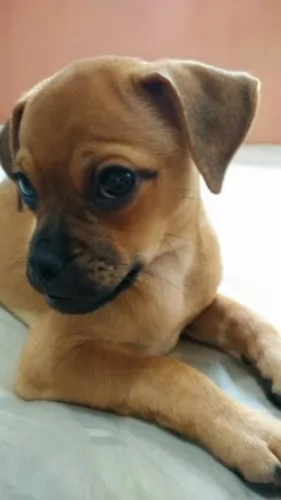 As previously mentioned, the Muggin is a cross between the Pug and the Miniature Pinscher. They are small, shave sturdy legs, floppy ears, and a wrinkled forehead for the most part. Like all hybrids however, all first generation dogs do not look the same. Some might resemble the Min Pin more and others the Pug. Some might have the stockier body of the Pug and the short tail of the Min Pin. Or one could have the Pug’s curly tail and the athletic body of the Min Pin. The snout can be short or long, the ears heavy and floppy or small and thin.
As previously mentioned, the Muggin is a cross between the Pug and the Miniature Pinscher. They are small, shave sturdy legs, floppy ears, and a wrinkled forehead for the most part. Like all hybrids however, all first generation dogs do not look the same. Some might resemble the Min Pin more and others the Pug. Some might have the stockier body of the Pug and the short tail of the Min Pin. Or one could have the Pug’s curly tail and the athletic body of the Min Pin. The snout can be short or long, the ears heavy and floppy or small and thin.
Their coats will usually be fine and short, and colors can vary a lot. They might be black and tan like a Min Pin, or more like a Pug with a solid color of cream, brown, black, white or golden. They also tend to shed quite a bit no matter which parent they take after the most. They will either have brown noses and black eyes or brown eyes and black noses or any combination of black and brown.
If Muggins are only bred to Muggins the second and third generations will resemble each other more than the first generations will. However, at this point many breeders will try to strengthen the breed by occasionally adding in to the gene pool other dog breeds.
 Your Perdiguero de Burgos is such an amicable dog, making a splendid family pet. He can sometimes be a little reserved but he is never aggressive.
Your Perdiguero de Burgos is such an amicable dog, making a splendid family pet. He can sometimes be a little reserved but he is never aggressive.
He can be stubborn but he is intelligent and responds well to training and socialization. He is lively, playful, energetic, calm and loving and he will be willing to join you when you go out jogging or riding your bicycle.
When it comes to grooming he is also pretty low maintenance, so you can see that when it comes to choosing a fantastic family pet, this easy-going, calm dog should be a top consideration.
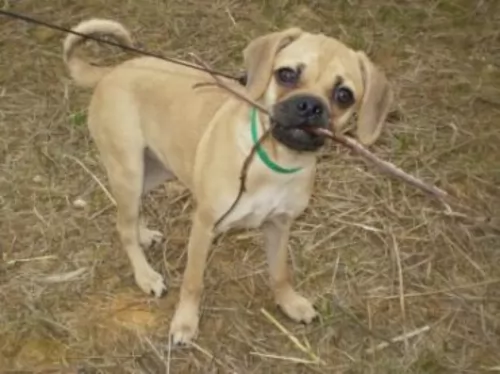 They are good with children but should be supervised.
They are good with children but should be supervised.
Energetic and loving little dogs.
Very adaptable if taken for walks or has space in a yard. Can live anywhere under those circumstances.
Very intelligent but strong willed dog. Needs strong leadership from their person.
 All dogs can develop health problems, and with the Perdiguero de Burgos you will need to be made aware of some of the common heath problems there are -
All dogs can develop health problems, and with the Perdiguero de Burgos you will need to be made aware of some of the common heath problems there are -
Hip dysplasia is a common skeletal disease where the dog’s hip joints don’t develop properly and the hips partially dislocate. It makes it very painful for the dog to get around. Hip dysplasia is a genetic condition, although diet and environmental factors can play a big part too. Rapid weight gain can also contribute to hip dysplasia as the extra weight puts strain on the joints.
This is caused by inflammation of the thyroid gland. Thyroid cancer can also cause hypothyroidism, and it occurs more often in large breed dogs. A common sign of low thyroid function in dogs includes thinning of the hair and a dull, lifeless coat. There is also weight gain and reduced activity. Hypothyroid dogs also are inclined to have ear infections as well as skin infections. Your pet will need to get to the vet for blood tests and treatment.
Other health problems include eye problems, allergies, bloat and even epilepsy. Once you buy a puppy, it is your responsibility to protect him from some of the deadly diseases there are and take him to the vet for his puppy vaccines.
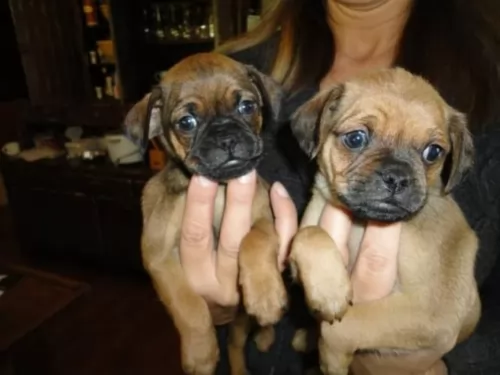 The first generation of Muggins may face all the health issues of either or both their parents, while second and third generations tend to have less health issues, They types of issues the first generation of Muggins might face include:
The first generation of Muggins may face all the health issues of either or both their parents, while second and third generations tend to have less health issues, They types of issues the first generation of Muggins might face include:
Nerve Degeneration – Degenerative Myelopathy or Dm – causes paralysis and eventually fatal.
 Exercise is of critical importance to these energetic dogs. That is why it is important for them to live in a home where there is plenty of opportunity to run, swim and hike. They’re way too energetic to be confined to a tiny city property.
Exercise is of critical importance to these energetic dogs. That is why it is important for them to live in a home where there is plenty of opportunity to run, swim and hike. They’re way too energetic to be confined to a tiny city property.
The dog is an average shedder and the smooth coat of the Perdiguero de Burgos simply requires a brush-down twice a week. A rub down too with a chamois will be therapeutic for your pet and leave the coat shiny and vibrant.
Rubbing your pet down like this will give you the opportunity to feel for any unusual lumps and check for fleas and ticks. It is also your chance to check inside the dog’s ears. The ears are floppy and because the dog loves water so much, dirt, wax and moisture can be a breeding place for bacteria and painful ear infections.
If you feed your Perdiguero de Burgos a commercially manufactured dog food, make sure you choose a high quality one that has been manufactured particularly for large, energetic dogs. Some of the poor quality foods have bad ingredients in them such as colorants, preservatives and worthless, toxic fillers that can have a detrimental affect on your pets health.
Try and include some tasty homemade food into your dog’s diet too. Tasty, nutritious food such as boiled chicken, brown rice or pasta and wholesome vegetables such as sweet potato, carrots and spinach will do your pet the world of good. You can every now and then, also include some raw meat.
All a dog wants is a simple, wholesome diet like this as it ensures he doesn’t have any digestive upsets. Dogs like simplicity and consistency. Make sure your pet has a never-ending supply of fresh, cool water.
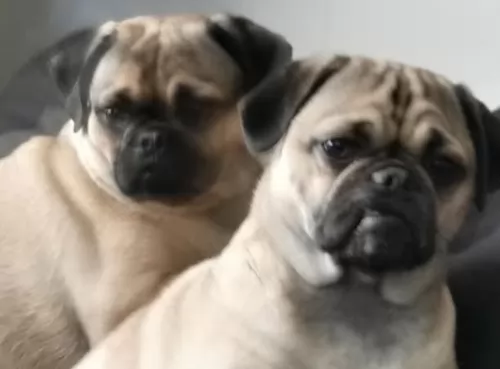 This crossbreed has a definite propensity to overeat and become obese from puppyhood. Feed the puppy a small dog dry food 3-4 times a day a total of ¾ of a cup to 1 cup.
This crossbreed has a definite propensity to overeat and become obese from puppyhood. Feed the puppy a small dog dry food 3-4 times a day a total of ¾ of a cup to 1 cup.
Again don’t over feed the adult Muggin or he will become obese easily. Feed at least twice a day one to one and half cups total.
High Energy
With the athleticism of the Min Pin taking precedence over the less active Pug, the Muggin is a fairly active dog. The Muggin is also not effective by the Pug’s difficulty with heat and cold. They love to go on long walks and need exercise to keep from being bored and destructive. However, remember there is a Pug in your Muggin and if she is not into exercise don’t try to get her to do more than she can.
You do want your Muggin to get enough exercise to fend off any tendency to be overweight. They are good at agility, jogging, obedience and watchdog activities.